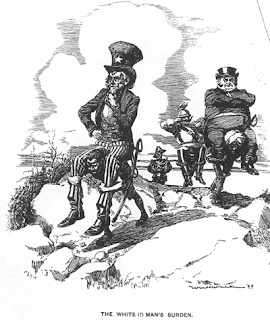"The White Man's Burden" is a poem by the English poet Rudyard Kipling. It was originally published in the popular magazine McClure's in 1899, with the subtitle The United States and the Philippine Islands. Although Kipling's poem mixed exhortation to empire with somber warnings of the costs involved, imperialists within the United States understood the phrase "white man's burden" as a characterization for imperialism that justified the policy as a noble enterprise.
The poem was originally written for Queen Victoria's Diamond Jubilee, but exchanged for "Recessional"; Kipling changed the text of "Burden" to reflect the subject of American colonization of the Philippines, recently won from Spain in the Spanish-American War. The poem consists of seven stanzas, following a regular rhyme scheme.
At face value it appears to be a rhetorical command to white men to colonise and rule other nations for the benefit of those people (both the people and the duty may be seen as representing the "burden" of the title). Because of its theme and title, it has become emblematic both of Eurocentricracism and of Western aspirations to dominate the developing world. A century after its publication, the poem still rouses strong emotions, and can be analyzed from a variety of perspectives.

No comments:
Post a Comment